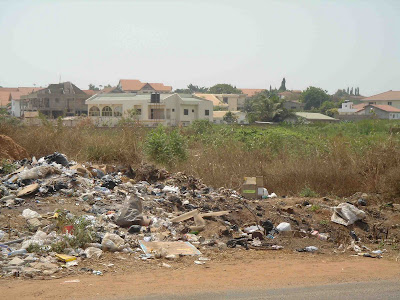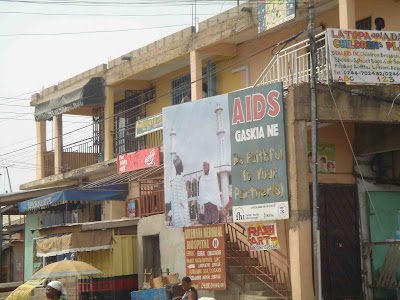Growth
The rains have begun, and they are a thing to behold. Everyone told us the rainy season around here would be dramatic, and it turns out they were employing phrases like 'the sky opens' and 'monsoon' in the literal sense. But what no one remembered to mention is the wind that goes along with the rain. It's unbelievable -- easily 50+mph gusts, ripping corrugated metal roofs off of shacks, sending dirt and debris tearing down the streets.
I passed the first of these storms in a tro-tro with a visiting friend. We were going to take a day trip to some botanical gardens outside of Accra, rent bikes, do the tourist thing. Somewhere in the hills north of the city, our van began to rock back and forth in the wind. We pulled over, and almost instantly, we were in the deluge, water pouring in the poorly-sealed (not even sure the use of the word "sealed" is appropriate here) windows. Over the course of an hour, we would occasionally move a little and then stop again. It was unclear what would prompt these decisions to drive on, as, to our untrained eyes, the conditions hadn't changed AT ALL -- rain still beating down, wind still blowing sheets of metal past us, lightning striking all around. I suppose this untrained eye is used to functioning wipers on vehicles, though, so what do I know?
Anyway, after a few hours, it stopped. This cycle has repeated several times over the past two weeks. Total celestial mayhem...and then, everything that survives is a bit greener and cleaner. The idea of rain as the dual-agent of destruction and renewal had until now been a metaphor to me. But in a place where the ramshackle and the rooted, the fortified and the vulnerable, are practically on top of each other, the power of the rain becomes quite literal. It highlights the already uncomfortable juxtaposition of extreme wealth and abject poverty that occurs in a place without much of a middle class.
In this post-rain light, I've decided to finally post my birthday thoughts for Ghana. (And appropriately, I got completely doused on my way to the cyber to do so.)
At 50, Ghana is being touted--both within and without--as a success. The slogan "Championing African Excellence" appears on tee-shirts, billboards, head scarves, television ads. It is clear that Ghana has many things going its way. Respectable democracy, peace, and a ton of money flowing into the country provide a very good base for growth...
...Along with "good governance," "growth" is definitely a favorite buzzword for this jubilee year. From our tiny perch, looking out at one small slice of this nation, it seems like all this talk about growth is no joke. The shops that were around when we arrived have doubled their inventories, little food stands have sprung up along every road, and there is construction (though often with suspicious scaffolding) in all directions. We've witnessed the birth of a new tro-tro station, the formalization of a new route, and the building and naming of a new bus-stop ("Block Factory"). Even our hostel is adding another floor.
[Editorial aside: (1) we have no idea where the "block factory" actually is...you'd think a huge decorative concrete block fabrication facility would be hard to miss, but apparently not. (2) Our hostel definitely has zero safety concern with this new addition, and bits of concrete rain down on the laundry area. However, just as drivers here believe that honking constitutes their sole responsibility vis-a-vis pedestrians, apparently because this construction is in fact visible, we have been duly warned. (3) Is it a 3rd floor or a 4th floor? Tough to say, and somewhat Escher-esque in that way. Thankfully it's not such a seismically active region...]
At first glance, all of this growth seems positive...but linger a little longer and it becomes clear that it's all private and the infrastructure is not keeping up...not even close. Accra is far beyond it's capacity in terms of garbage collection, sewage management, roads, water, electricity. The new residences springing up in this part of town are enormous, but they have no running water. Here's an image. Even without the open -- and blocked sewer (before the rains even started!) -- you get the idea:

And so I wonder about this growth when it can be counted in private new households, not functional neighborhoods; in individual fancy cars, not roads to hold them. While it is apparently easy to throw up a plantain stand next to the road, perhaps the most disturbing aspect of Ghana's lagging infrastructure is that middle-class Ghanaians who want to start on-the-books businesses here say that it's actually quite difficult. A woman down the street, born in Ghana but raised in London, moved back to open a cafe. It's finally running, but it took her two incredibly frustrating years. A friend of mine, Ghanaian but born and raised in New Mexico, just moved back here to start a sustainable mining company aimed at bringing the resources back to the mining communities. He's incredibly smart and has started and run successful businesses, but he wants to tear his hear out over the red tape and corruption. Shouldn't this be Ghana's dream? Educated Ghanaians who want to move back to the country and invest?!?
My birthday wish for Ghana is that growth continue, but that opportunities be accessible to everyone. I'd like to see the government get its act together to support all of these entrepreneurs in a tangible way. Make it worthwhile to be on the books; make it easier to start a business. Invest the resulting tax revenue in infrastructure -- water, electricity, roads, sanitation, transportation -- that will provide a stable backdrop for all classes to pursue better quality of life. Someone pointed out to me that the government spent as much money on the 50th anniversary celebration as the nation received in food aid last year. It's great - and appropriate - to celebrate 50 years of freedom. With a little bit of effort, though, Ghana could be celebrating across-the-board growth and freedom from food aid entirely. In a few years, the rains could be leaving everyone feeling renewed.
I passed the first of these storms in a tro-tro with a visiting friend. We were going to take a day trip to some botanical gardens outside of Accra, rent bikes, do the tourist thing. Somewhere in the hills north of the city, our van began to rock back and forth in the wind. We pulled over, and almost instantly, we were in the deluge, water pouring in the poorly-sealed (not even sure the use of the word "sealed" is appropriate here) windows. Over the course of an hour, we would occasionally move a little and then stop again. It was unclear what would prompt these decisions to drive on, as, to our untrained eyes, the conditions hadn't changed AT ALL -- rain still beating down, wind still blowing sheets of metal past us, lightning striking all around. I suppose this untrained eye is used to functioning wipers on vehicles, though, so what do I know?
Anyway, after a few hours, it stopped. This cycle has repeated several times over the past two weeks. Total celestial mayhem...and then, everything that survives is a bit greener and cleaner. The idea of rain as the dual-agent of destruction and renewal had until now been a metaphor to me. But in a place where the ramshackle and the rooted, the fortified and the vulnerable, are practically on top of each other, the power of the rain becomes quite literal. It highlights the already uncomfortable juxtaposition of extreme wealth and abject poverty that occurs in a place without much of a middle class.
In this post-rain light, I've decided to finally post my birthday thoughts for Ghana. (And appropriately, I got completely doused on my way to the cyber to do so.)
At 50, Ghana is being touted--both within and without--as a success. The slogan "Championing African Excellence" appears on tee-shirts, billboards, head scarves, television ads. It is clear that Ghana has many things going its way. Respectable democracy, peace, and a ton of money flowing into the country provide a very good base for growth...
...Along with "good governance," "growth" is definitely a favorite buzzword for this jubilee year. From our tiny perch, looking out at one small slice of this nation, it seems like all this talk about growth is no joke. The shops that were around when we arrived have doubled their inventories, little food stands have sprung up along every road, and there is construction (though often with suspicious scaffolding) in all directions. We've witnessed the birth of a new tro-tro station, the formalization of a new route, and the building and naming of a new bus-stop ("Block Factory"). Even our hostel is adding another floor.
[Editorial aside: (1) we have no idea where the "block factory" actually is...you'd think a huge decorative concrete block fabrication facility would be hard to miss, but apparently not. (2) Our hostel definitely has zero safety concern with this new addition, and bits of concrete rain down on the laundry area. However, just as drivers here believe that honking constitutes their sole responsibility vis-a-vis pedestrians, apparently because this construction is in fact visible, we have been duly warned. (3) Is it a 3rd floor or a 4th floor? Tough to say, and somewhat Escher-esque in that way. Thankfully it's not such a seismically active region...]
At first glance, all of this growth seems positive...but linger a little longer and it becomes clear that it's all private and the infrastructure is not keeping up...not even close. Accra is far beyond it's capacity in terms of garbage collection, sewage management, roads, water, electricity. The new residences springing up in this part of town are enormous, but they have no running water. Here's an image. Even without the open -- and blocked sewer (before the rains even started!) -- you get the idea:

And so I wonder about this growth when it can be counted in private new households, not functional neighborhoods; in individual fancy cars, not roads to hold them. While it is apparently easy to throw up a plantain stand next to the road, perhaps the most disturbing aspect of Ghana's lagging infrastructure is that middle-class Ghanaians who want to start on-the-books businesses here say that it's actually quite difficult. A woman down the street, born in Ghana but raised in London, moved back to open a cafe. It's finally running, but it took her two incredibly frustrating years. A friend of mine, Ghanaian but born and raised in New Mexico, just moved back here to start a sustainable mining company aimed at bringing the resources back to the mining communities. He's incredibly smart and has started and run successful businesses, but he wants to tear his hear out over the red tape and corruption. Shouldn't this be Ghana's dream? Educated Ghanaians who want to move back to the country and invest?!?
My birthday wish for Ghana is that growth continue, but that opportunities be accessible to everyone. I'd like to see the government get its act together to support all of these entrepreneurs in a tangible way. Make it worthwhile to be on the books; make it easier to start a business. Invest the resulting tax revenue in infrastructure -- water, electricity, roads, sanitation, transportation -- that will provide a stable backdrop for all classes to pursue better quality of life. Someone pointed out to me that the government spent as much money on the 50th anniversary celebration as the nation received in food aid last year. It's great - and appropriate - to celebrate 50 years of freedom. With a little bit of effort, though, Ghana could be celebrating across-the-board growth and freedom from food aid entirely. In a few years, the rains could be leaving everyone feeling renewed.



